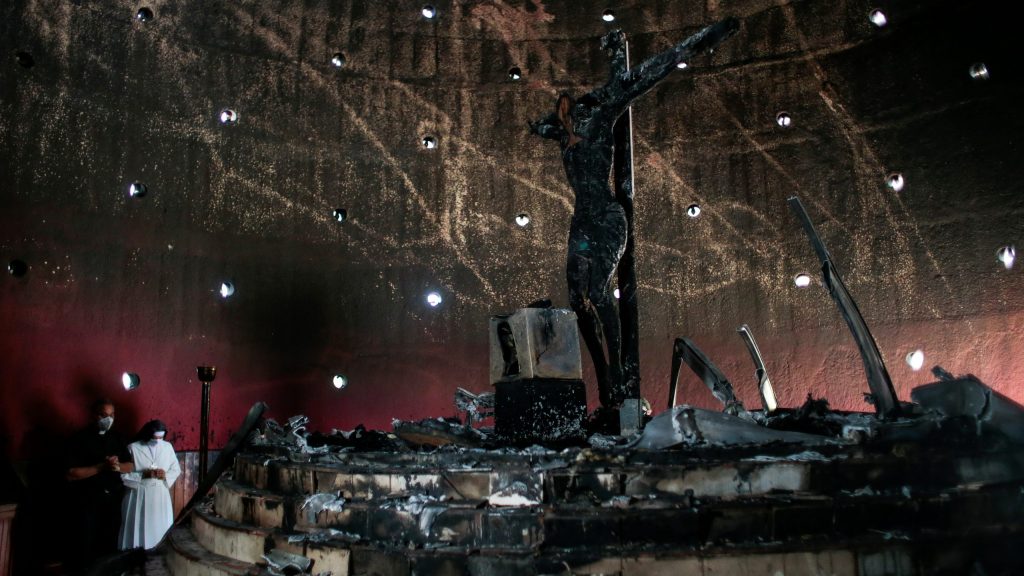Nicaragua’s lone cardinal says that the hierarchy of the Catholic Church is ready to face the persecution the government might carry out against them, and that they will continue speaking up in favor of democracy, unafraid of the consequences.
Some 25 opposition leaders, including several presidential hopefuls for the November 7 national elections, have been imprisoned in the past month by President Daniel Ortega and his wife, Vice President Rosario Murillo, forcing several countries, including the United States, and international organizations such as the United Nations, to voice concern over the state of the country’s democracy.
Cardinal Leopoldo Brenes, Archbishop of Managua, Nicaragua’s capital, said on Saturday that the priests and all of the Catholic Church is ready to face the “reprisals” from the government.
The reprisals “will be welcomed, and we’ll always deal with as we did in the 1980s [during Ortega’s first term], when there were very difficult situations,” he said. “The Church is not led by men. We’re but instruments, the Church is animated and strengthened by the Holy Spirit. We continue to fulfill the mission that the Lord has entrusted us with.”
The prelate also said that, despite the allegations made by the government, the Catholic Church has no intention of becoming a political institution in Nicaragua. Ortega and Murillo have repeatedly accused the local hierarchy of being behind a series of massive protests that began in April 2018. Hundreds were killed in clashes between protesters and security forces, and thousands were imprisoned and have remained incarcerated, still awaiting trial. Tens of thousands fled the country, including Brenes’s auxiliary, Bishop Silvio Jose Baez.
“At no point do we want to assume a political role, our job is to evangelize, our job is the work of love from Christ, who came that we can have life and life in abundance,” Brenes told reporters. “The Church does not have the capacity to hate, not through gestures nor through words; we pray for those who might criticize us and harass us, and this gives us peace.”
The cardinal’s words came after he celebrated Mass in Managua’s Cathedral to mark the one-year anniversary of the arson attack against the church’s wooden crucifix. Though the government, through a police report, claims that it was an accident, eyewitnesses have testified that an assailant came into the church July 30, 2020, shouted “I come for the Blood of Christ” – the name of the statue – and threw a Molotov cocktail at the image.
“We continue to sustain that this was an attack,” Brenes said. “The VP said that it wasn’t because of the police report, but we don’t agree.”
The cardinal was speaking after Ortega’s latest diatribe against the bishops, calling them Pharisees during a speech last week.
“In parallel to the cross, the sword; in parallel to the cross, the brutal crimes against our ancestors who dared to defend their rights,” Ortega said on Friday. “And with the sword they made a perfect combination, using Christ to destroy the life of our indigenous peoples. And millions were exterminated, and we see that this is a never-ending story, because horrible crimes continue to be discovered.”
“Priests go around [talking against me] as if they were saints, and all you need to do is to scratch the surface and what you find scum where there’s no respect for God,” the president said.
At the same event, Murillo spoke of “satanic actions” by Catholic priests against the regime on the hands of priests.
Brenes said, “will continue forth, regardless of what is said about us. There are so many fanatics that sometimes, they walk close by and shout at us. If they shout at me, I laugh.”
“We believe in God, and we support ourselves in this, and this is our strength, as well as the Virgin Mary. They are our hope, and this is what priests, bishops and the laity think. Thankfully, we’re at ease carrying out our evangelizing mission,” the cardinal said.
Earlier, during his homily, he had called the events surrounding last year’s arson as a “shameful attack, product of the hatred against the faith we all profess. But Christ, the Lord, came to break the walls of hatred.”
“When it comes to the Church, there is no hatred but love,” the cardinal said. “This is the teaching of Jesus who, being beaten, given a crown of thorns and crucified, from his mouth and from his gestures, there was never a gesture of hatred.”
He also said that, despite the fact that unless directly asked about it the Church “keeps silent” about what happen, in an attempt to avoid direct confrontation, the institution has not stopped signaling that this was a “sacrilegious act” against the Church.
“Silence says a lot,” he said. “How many times Jesus kept silence. But the silence was also questioning.”
The Church’s answer to hatred, Brenes said, is to try to break the circle of hate, and that to accomplish this there’s only Christ’s recommendation: “Prayer, to pray for those who slander us, defame us, hate us.”
He also claimed the fact that the Eucharistic hosts that were kept under the wooden image are still there is a “miracle,” and noted the 18th century image is still standing, despite the fire damage.
“The great symbol of a witness, the cross, is still there. He is our strength. Christ is there. Calcinated, but alive. He’s a God of the living, as if saying ‘they tried to destroy me, but I’m still standing’,” Brenes said.

